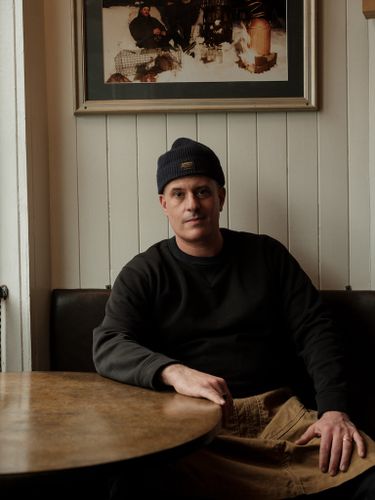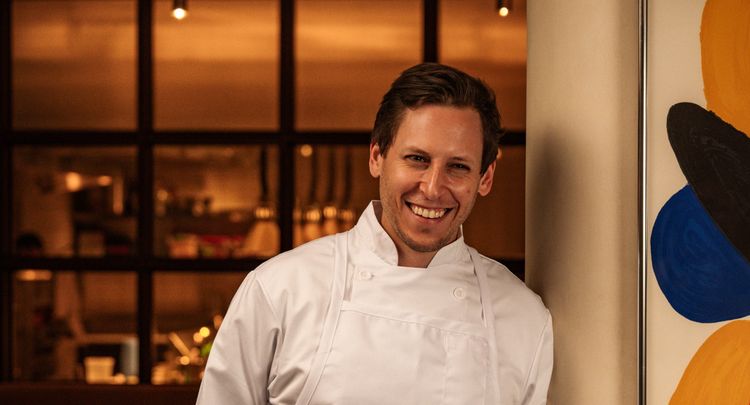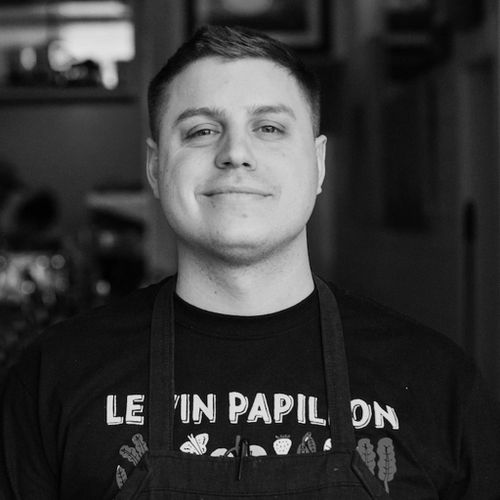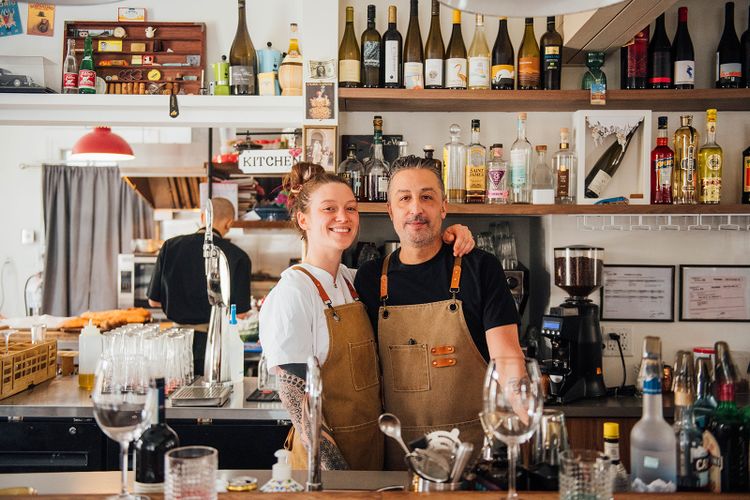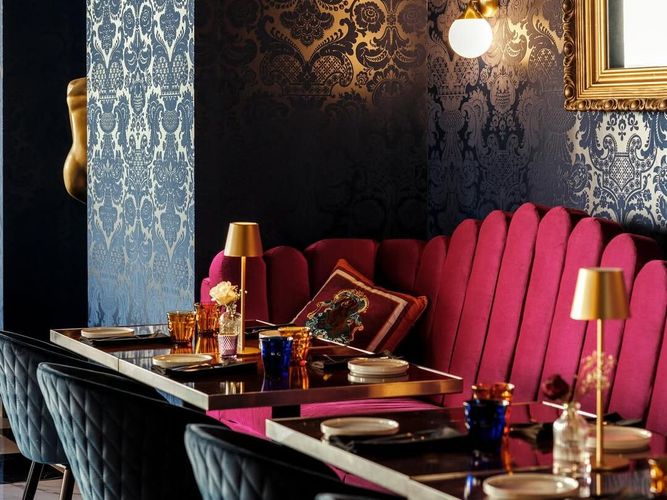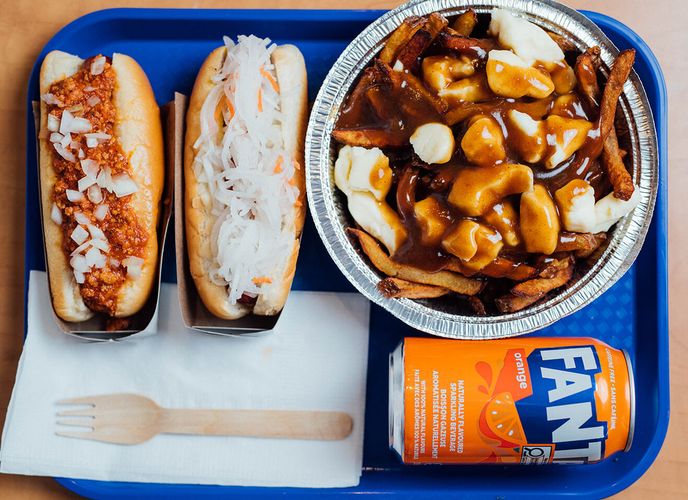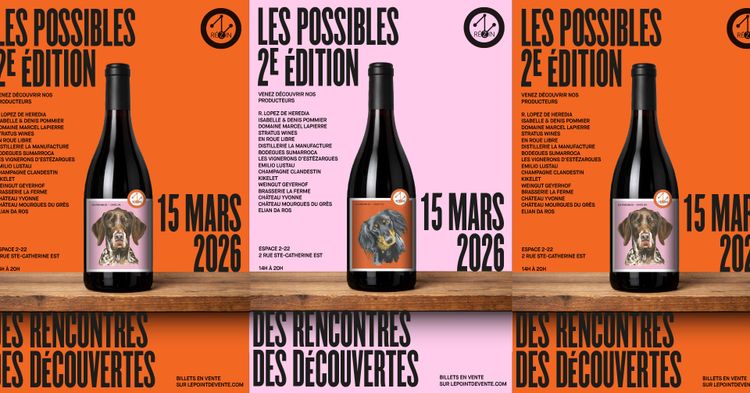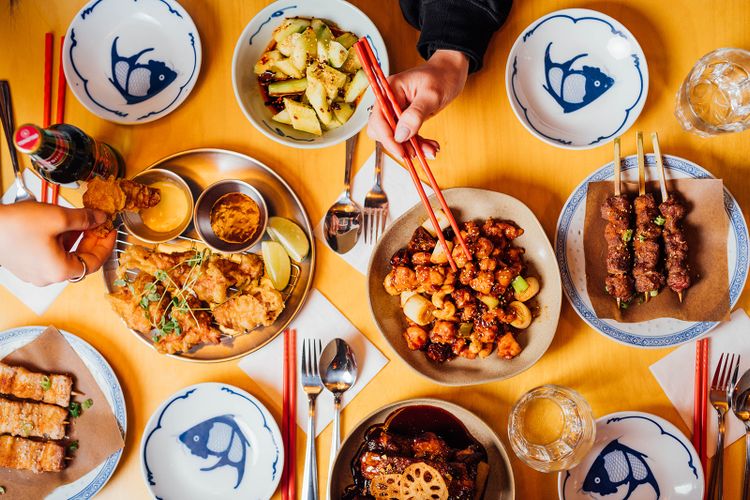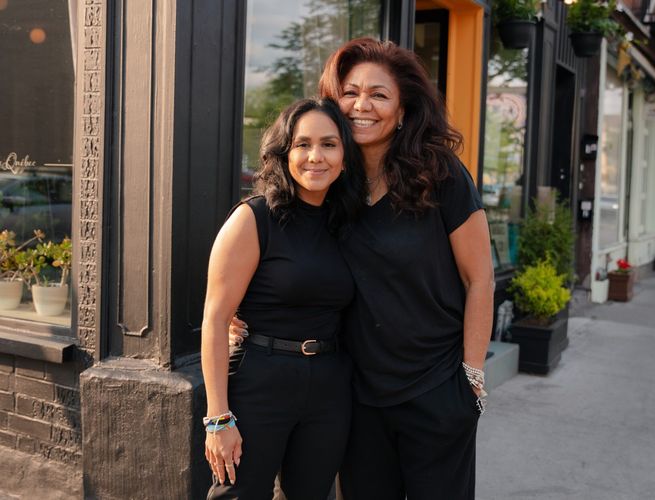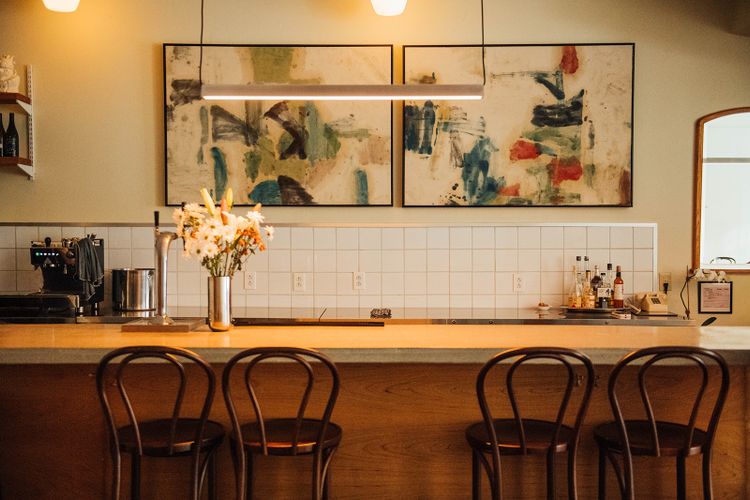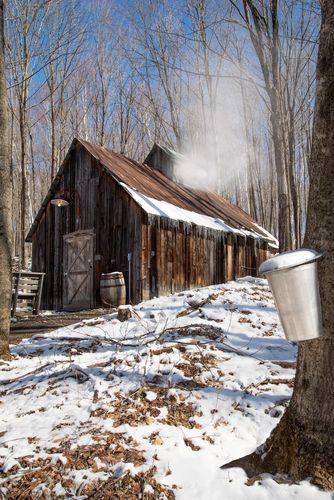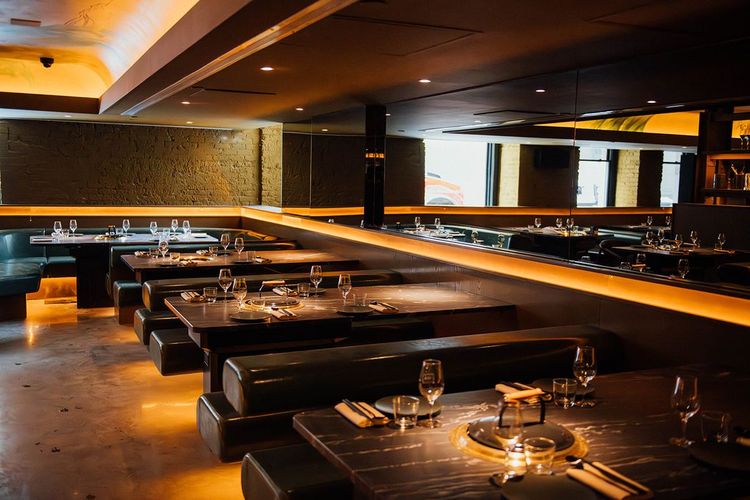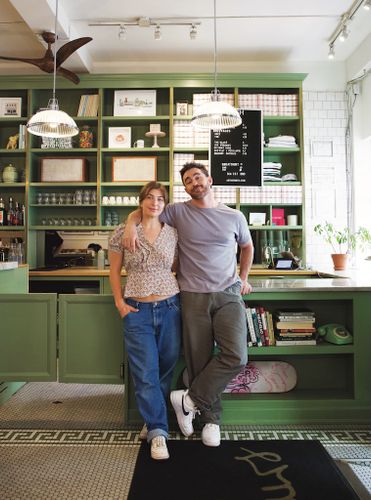Steve Beauséjour and his contagious joie de vivre

When we think of a man with his heart on his sleeve, always ready to help his community, with a contagious joie de vivre, and a passion like no other in his domain, only one person comes to mind: Steve Beauséjour. The man who has been an emblematic figure of the private import company RéZin for nearly 10 years tells us about his life journey.
An early introduction to wine
Steve Beauséjour’s journey began at a very young age. “My mother is an herbalist. At home, we always cured ourselves with plants, root tinctures, homeopathic drops, and essential oils. All these concoctions have a taste. It is the taste of the living that is extracted. It has always been part of my DNA to try to understand how humans decipher the taste of food. Despite the fact that I was picky about food as a youngster, I was always excited to taste and feel the foods I had on hand.”
As a teenager, Steve gradually became involved in the world of wine. “I was never a big fan of beer. Of course, like any teenager, I had a few drunken nights of drinking beer. But, above all, what I loved was wine. I must have been 14-15 years old and I was already drinking it. I read a lot about wine on my own, especially about aromas, while savouring the bottles I bought. I liked some wines more than others. I wanted to go deeper, to understand, to push my reflection further on what I smelled, what I tasted”.
His grandfather was also a great source of inspiration for him, himself making wine in the traditional way that he had learned from an Italian man. “He would de-stem his grapes, macerate them in carboys, ferment the must under the heater in the garage, and then bottle the final product in one-liter bottles without SO2. I thought the wine tasted different from what I was drinking, but I thought it was really good.”
In his early twenties, Steve Beauséjour found a job that allowed him to make a good living. Curious and gourmet by nature, he put his knowledge to good use in the world of gastronomy and wine. “I used to eat at Au Pied de Cochon, Toqué!, and I savoured the first natural wines imported to Quebec: Georges Descombes, Marcel Lapierre, Claude Courtois, Gramenon, Marc Pesnot. That’s when something clicked for me. The taste and smell I had acquired from my mother allowed me to recognize certain tastes and aromas in natural wine. I realized that the wines I drank at home were nothing like the ones I savoured at the restaurant, that natural wines were more than just an alcohol, that they were a maceration of living ingredients that bubbled with life. Without being technically perfect, the wines were going in another direction that I had never explored.”
The curiosity to learn
Following this revelation, Steve decided to follow his passion and enrolled in 2005 in the ASP in sommellerie at the ITHQ to acquire more knowledge and become familiar with technical terms. “In spite of my gustatory and olfactory background, I read a lot of books on wine and I couldn’t understand the terms used to describe it. These terms seemed, to me, unimportant and reserved for a certain elite. I was just trying to understand what I was tasting. I had previously done a year in hotel management, but I ended up dropping out of the program. In those years, sommellerie was not as popular as it is today. There was a lack of applicants. Nevertheless, the ASP still took place. I knew from the start that I was going to pass because I loved it so much.”
A vegetarian at the time, Steve Beauséjour enjoyed challenging his classmates to wine and food pairing tastings. “Of course, a glass of Sauvignon Blanc would go well with poached sole with beurre blanc, and a glass of Bordeaux would go well with a flank steak with mushroom sauce, but what about vegetarians? I pushed my colleagues to look beyond the ingredient; where is it from? How can we get the best out of it?”
Democratizing wine
Far from imagining that he would one day become a sommelier, Steve undertook his studies for the sheer pleasure and curiosity that we all admire in this passionate man. “I woke up in the morning and wanted to learn, to understand the why and the how. All my life, I have been trying to find out why about everything and nothing. We are taught in school that there is only one truth, that a Riesling smells of hydrocarbons for example. But is this the classic Riesling sample worked in the same way by the same oenologist for 25 years, or did it taste different 150 years ago? Was it due to a lack of maturity and aging that this wine developed these hydrocarbon flavours? I don’t think we can talk about the characteristics of a varietal. For me, a varietal is not distinctive. It is the reflection of a place which makes its characteristics. The place brings its characteristics to the fruit, and not the fruit in its place”.
“Modern sommellerie as we know it and as we learn it in school was born at the same time as chemicals. Wine has over 8,000 years of history and that 70-80 years seems to define it entirely. I believe that this period has its place in history, but it can allow us to reconnect with the true values of wines, the bubbly side of the wines of that time. Nowadays, we have notions of microbiology, of super advanced chemistry, we understand enzymatic and yeast interactions, we are able to know which minerals are found in the soil. All of this knowledge can help us better interact with living things, to let them express themselves to their full potential.”
Steve had the thirst to keep learning, but he quickly realized the need to democratize wine, to put more emphasis on the feeling and emotion rather than on the techniques that are given to it.
“We tend to detect aromas, but I prefer to recognize the profile of the wine. The aroma of a wine is unique to each individual. I prefer to stick to the energy, to see the emotion that a wine can bring to us, its power, its exuberance, to reconnect with how my body reacts when I absorb this liquid. More and more waiters and sommeliers are talking about wine with their feelings and not with techniques. That’s what always attracted me to sommellerie, and that’s why I unlearned the technical dimension of wine when I got out of school. For me, a flawless wine is not a technique, it’s standardization. A technically perfect wine is for me one of the biggest defects, because there is little quality. All the wines look the same and the human has no place anymore.”
“For a long time, customers, at least those who are interested in wine, have been intimidated by the presence of an old-school sommelier, and/or by terms that no one understands. Customers may not feel comfortable or are self-deprecating about their knowledge of wine, but instead, we owe it to them to make them feel confident that they know wine inside and out. I think it is important to get back to the essence of wine, to be able to popularize its feeling without lowering it to a simple level, to make it accessible to everyone, whether it is for the very fussy clientele or for those who don’t know much about it. After all, wine is about sharing and exchange.”
Wine, close to people
Shortly after finishing his studies in sommellerie, Steve Beauséjour got his first work experience in the world of wine in Montreal.
“I was studying and working as a doorman at the Saint-Paul Hotel in Old Montreal. It must have been six months that I’d finished my studies at the ITHQ. Xavier Burini, former assistant sommelier at Restaurant Cube, left his position to open Les Trois Petits Bouchons on Saint Denis Street. The position of assistant sommelier became vacant and I offered my services. I gave it a try and I loved my experience. I couldn’t believe that my first experience in the restaurant industry was as an assistant sommelier in one of the best restaurants in Montreal. I still thank Richard Gaulin, chef sommelier of the place, for giving me this opportunity.”
Steve Beauséjour then went on to work a series of jobs in the restaurant industry. He managed his first wine list at the restaurant Vallier, then went to work at Laloux, then went to the Bouchonné Comptoir à Vin (now Larry’s), to finish his career at the restaurant Les Trois Petits Bouchons. It was at this time that he met Jean-Philippe Lefebvre from RéZin.
“I started at RéZin at the same time as I was working at Trois Petits Bouchons. Jean-Philippe used to come and eat at the restaurant regularly. He liked my approach to wine. He told me I should work for him. I finally decided to meet with him to discuss a possible job and I accepted a part-time position at RéZin, which later became full-time.”
The RéZin adventure
“My official title at RéZin was sales representative, but I saw myself more as a representative of humans who ferment grape juice naturally. I am an ambassador for the humans I love. The sales aspect always worked against me, as I wasn’t able to make the deal. I was more into highlighting the humans I love, despite the fact that the wines I was tasting might not be at their best. I’m not a born salesman, but when I believe in it, my message really gets through. I do a human job because I love people. I often come back to the example of Hervé Villemade and Jean-François Nicq, they are human beings that I personally really love. They are people with whom you make a connection. You want to tell humanity how proud you are to be part of their lives. That’s always been the angle I’ve focused on in my work at ReZin.”
“ReZin has brought several things to my life. The aspect that I benefited from the most was having a dimension that I didn’t have, being able to go deep into the human, understanding the human value added in the beverage. Having traveled and met wonderful people, you detach yourself from all the volatility, the fragility, the technical side that a wine can have. You realize that wine is one thing, but that the human being is another.”
The pandemic was — as it was for many of us — a turning point in his career. Although Steve Beauséjour no longer works for RéZin, he remains an iconic figure in the Montreal wine world. “On March 14, 2020, the government’s announcements meant that I lost my job overnight. I sold wine almost exclusively to restaurants in Montreal, so 95% of my customers had to close up shop. I could have applied for ECP like many did, but I decided to roll up my sleeves. When there is an unlikely or difficult situation, I fall into solution mode. I didn’t want my family or friends to go grocery shopping. I was already doing business with several farms, collecting their unsold produce for redistribution, all in a spirit of mutual aid. I wanted to keep a link with my customers and friends that I could not really see anymore. This is what led me to do several markets, whether it was at Lundi au Soleil or at Brasserie Réservoir, it was always with a view to helping businesses get their heads above water in a situation that no one could control.”
Getting back to basics
What does the future hold for Steve Beauséjour? “I’ve dabbled in wine representation for 10 years, before that I was in the restaurant industry, but now I want to dabble in agriculture and wine making. There is a big part of me that has the desire to help pave the way for Quebec’s wine culture. I took over a hectare of a vineyard seven kilometers from the Vignoble de la Bauge with Véronique Lemieux of Vigne en Ville and Alex Boily. The space already has Frontenac Gris and Frontenac Noir vines and we are also going to transform the place into permaculture. I will continue to lend a hand at Vignoble de la Bauge, as I did last year. We will be bottling the 2021 vintages next June. Other than that, I have a new project coming up, CAV, the Coalition Avenir du Vin. What is CAV? Stay tuned!”
Written by Antoine Gariépy
